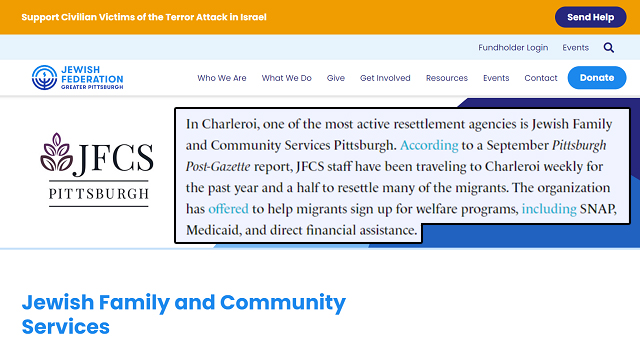Chris Rufo investigated how 2,000 Haitian migrants “suddenly arrived” in the small town of Charleroi, Pennsylvania and discovered “an open conspiracy between the federal government, publicly funded NGOs, and private corporations.”
We conducted an investigation to understand how 2,000 Haitian migrants suddenly arrived in Charleroi, Pennsylvania. The answer: an open conspiracy between the federal government, publicly funded NGOs, and private corporations. Here’s how it works:https://t.co/497fkBJXVu
— Christopher F. Rufo ⚔️ (@realchrisrufo) October 8, 2024
From City Journal:
A Troubled Place
In Charleroi, Pennsylvania, the local population grapples with a surge of Haitian migrants.
by Christopher F. Rufo, Christina Buttons
Charleroi, Pennsylvania, is a deeply troubled place. The former steel town, built along a stretch of the Monongahela River, south of Pittsburgh, has experienced the typical Rust Belt rise and fall. The industrial economy, which had turned it into something resembling a company town, hollowed out after the Second World War. Some residents fled; others succumbed to vices. The steel mills disappeared. Two drug-abuse treatment centers have since opened their doors.
The town’s population had steadily declined since the middle of the twentieth century, with the most recent Census reporting slightly more than 4,000 residents. Then, suddenly, things changed. Local officials estimate that approximately 2,000 predominantly Haitian migrants have moved in. The town’s Belgium Club and Slovak Club are mostly quiet nowadays, while the Haitians and other recent immigrants have quickly established their presence, even dominance, in a dilapidated corridor downtown.
[…] The basic pattern in Charleroi has been replicated in thousands of cities and towns across America: the federal government has opened the borders to all comers; a web of publicly funded NGOs has facilitated the flow of migrants within the country; local industries have welcomed the arrival of cheap, pliant labor.
[…] The initial, and most powerful, institution is the federal government. Over the past four years, Customs and Border Patrol has reported hundreds of thousands of encounters with Haitian nationals. In addition, the White House has admitted more than 210,000 Haitians through its controversial Humanitarian Parole Program for Cubans, Haitians, Nicaraguans, and Venezuelans (CHNV), which it paused in early August and has since relaunched. The program is presented as a “lawful pathway,” but critics, such as vice presidential candidate J. D. Vance, have called it an “abuse of asylum laws” and warned of its destabilizing effects on communities across the country.
The next link in the web is the network of publicly funded NGOs that provide migrants with resources to assist in travel, housing, income, and work. These groups are called “national resettlement agencies,” and serve as the key middleman in the flow of migration. The scale of this effort is astounding. These agencies are affiliated with more than 340 local offices nationwide and have received some $5.5 billion in new awards since 2021. And, because they are technically non-governmental institutions, they are not required to disclose detailed information about their operations.
In Charleroi, one of the most active resettlement agencies is Jewish Family and Community Services Pittsburgh. According to a September Pittsburgh Post-Gazette report, JFCS staff have been traveling to Charleroi weekly for the past year and a half to resettle many of the migrants. The organization has offered to help migrants sign up for welfare programs, including SNAP, Medicaid, and direct financial assistance. While JFCS Pittsburgh offers “employment services” to migrants, it denies any involvement with the employer and staffing agencies that were the focus of our investigation.
And yet, business is brisk. In 2023, JFCS Pittsburgh reported $12.5 million in revenue, of which $6.15 million came directly from government grants. Much of the remaining funding came from other nonprofits that also get federal funds, such as a $2.8 million grant from its parent organization, HIAS [The Hebrew Immigrant Aid Society]. And JFCS’s executives enjoy generous salaries: the CEO earned $215,590, the CFO $148,601, and the COO $125,218—all subsidized by the taxpayer.
Read the full article.
Mayorkas was on HAIS’s board of directors before being appointed to head the Department of Homeland Security under President Biden and throwing our border wide open to unlimited third-world immigration, as HAIS themselves noted after his appointment:
“We at HIAS have been so blessed to have Ali Mayorkas on our board of directors, and are thrilled to have him nominated to be the next Secretary of Homeland Security,” said HIAS President and CEO Mark Hetfield. “Ali has consistently demonstrated that he is not only a strong and highly respected leader, but an empathetic one who knows the heart of the stranger, as the child of a Holocaust survivor, as a Latino, and as a refugee and immigrant himself. Ali is uniquely suited to rebuild public trust in the Department of Homeland Security as he knows that America is at its greatest when we build bridges, not walls.”
Evidently, Mayorkas’s embrace of open borders, tearing down walls and welcoming the stranger does not apply universally.
As I reported last week, Mayorkas revealed that FEMA “does not have the funds” to make it through hurricane season just over one month after he announced the US will spend a record $454 million on the Nonprofit Security Grant Program to turn every Jewish institution in America into a veritable fortress.
This article originally appeared on Information Liberation and is republished by The Noticer with permission.





















